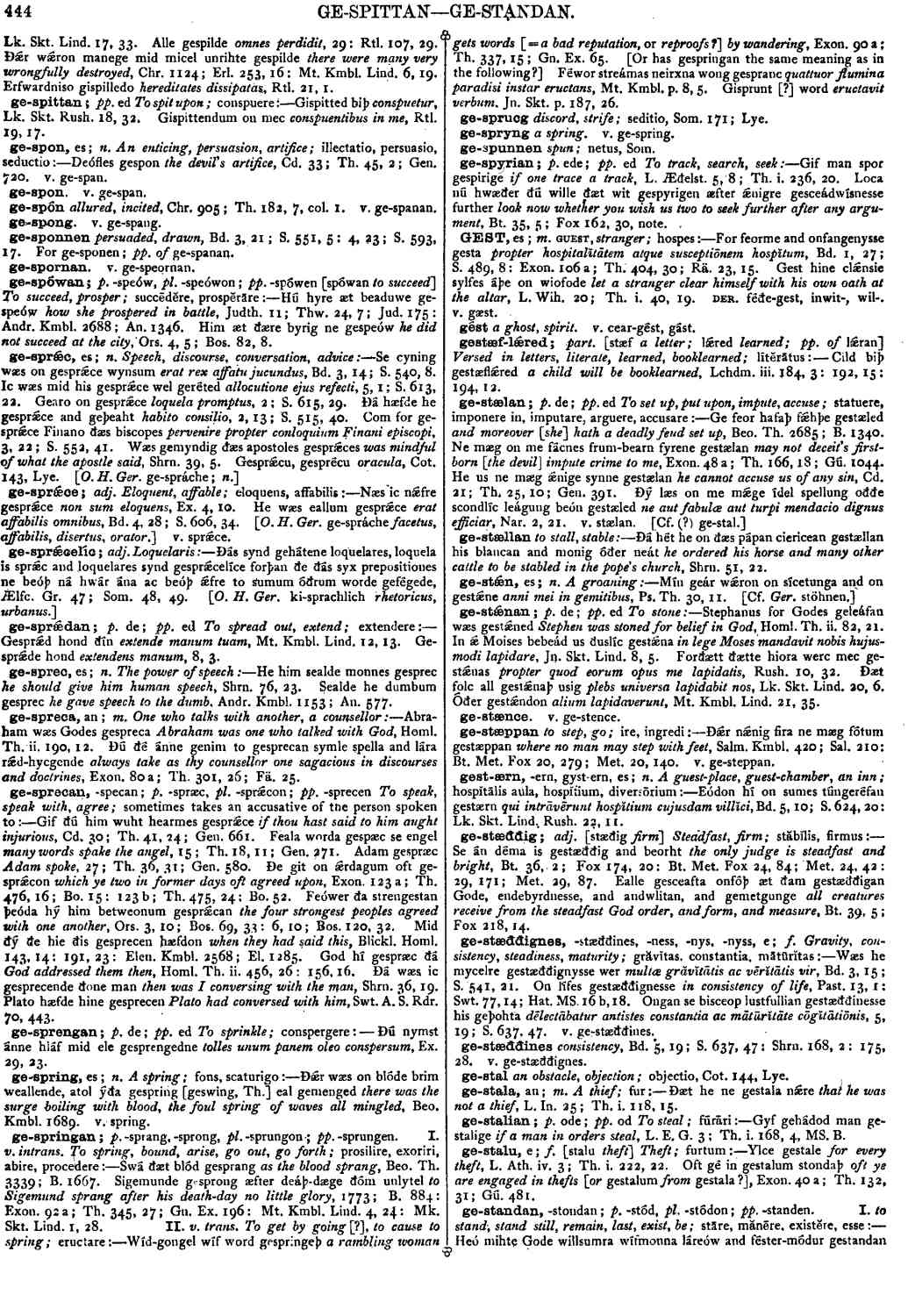ge-standan
- verb [ strong ]
-
Heó mihte Gode willsumra wífmonna láreów and féster-módur gestandan
ipsa Deo dēvōtārum māter ac nutrix posset existĕre fēmĭnārum,
- Bd. 4, 6; S. 574, 17: Ps. Th. 118, 114.
-
Eádig byþ se wer, se ðe him ege Drihtnes, on ferhþcleofan, fæste gestandeþ
beatus vir, qui tĭmet Dŏmĭnum,
- 111, 1: 113, 20.
-
He fór eaxlum gestód Deniga freán
he stood before the shoulders of the Danes' lord,
- Beo. Th. 722; B. 358: 813; B. 404: Andr. Kmbl. 1414; An. 707.
-
Æðelinga bearn ymbe gestódon
sons of nobles stood around,
- Beo. Th. 5188; B. 2597: Rood Kmbl. 126; Kr. 63.
-
His fótas ǽr fæste gestódan
stĕtērunt pĕdes ejus,
- Ps. Th. 131, 7: 93, 18.
-
Wese ðín milde mód geswíðed, and me to frófre fæste gestande
fiat nunc mĭsĕrĭcordia tua, ut consōlētur me,
- 118, 76.
-
Ahsige hú lange seó sibb gestóde
let him ask how long the peace lasted,
- Ors. 4, 7; Bos. 88, 6: Bd. 4. 23; S. 594, 40.
-
Ðæt gestód lytle leng ðonne vii hund wintra
that lasted a little longer than seven hundred years,
- Ors. 6, 1; Bos. 115, 28, 20.
-
Ðá gestód seó cweorn
the mill stopped,
- Shrn. 145, 28.
-
Hǽlend ðá gestód
the Saviour then stood still,
- Blickl. Homl. 15, 23: 219, 10.
-
Æfter ðære béne gestóden him mæssan
after the prayer they attended mass,
- Homl. Th. ii. 272, 15.
-
Hie on eallum heora lífe orleahtre gestódan
they continued blameless in all their life,
- Blickl. Homl. 163, 17, 4.
-
Hie mon to his andweardnesse héht gestandan
they were ordered to stand in his presence,
- 173, 11.
-
Siððan hyt gestanden beó
when it be stood,
- Herb. 1, 4; Lchdm. i. 72, 8.
-
He á wile ealra feónda gehwone fæste gestandan
he ever will firmly stand against every foe,
- Salm. Kmbl. 196; Sal. 97.
-
Forðam me fremde oft fácne gestódon
quŏniam ălieni insurrexērunt in me,
- Ps. Th. 53, 3.
-
Ne mæg hús náht lange standan on ðam heán múnte, gif hit full ungemetlíc wind gestent
a house cannot long stand on the high mountain if a violent wind press on it,
- Bt. 12; Fox 36, 16: 38, 1; Fox 194, 10.
-
Búton ðú gestande ðone unrihtwísan and him his unrihtwísnysse secge
unless thou oppose the unrighteous man and tell him his unrighteousness,
- Homl. Th. ii. 340, 23: i. 6, 24.
-
Ðá gestód hine swá micel líchamlíc costung
then so great a temptation of the body assailed him,
ii.- 156, 25: 122, 17: Guthl. 20; Gdwn. 80, 5.
-
Wæs heó gestanden mid hefigre untrumysse líchoman
she was seized with a heavy illness,
- Bd. 4, 23; S. 595, 16: 5, 13; S. 632, 17: Blickl. Homl. 227, 6.
Bosworth, Joseph. “ge-standan.” In An Anglo-Saxon Dictionary Online, edited by Thomas Northcote Toller, Christ Sean, and Ondřej Tichy. Prague: Faculty of Arts, Charles University, 2014. https://bosworthtoller.com/16143.
Checked: 0